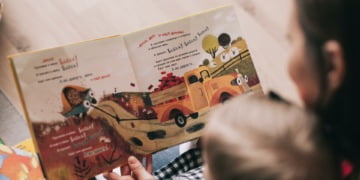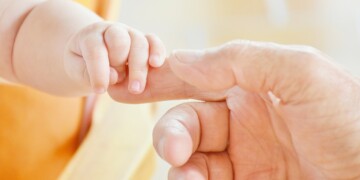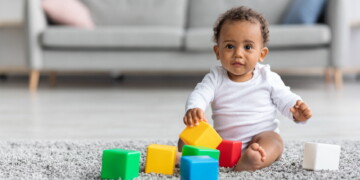The first year of life is a period of remarkable growth and development, particularly in sensory abilities.
Babies are born with all five senses—sight, hearing, touch, taste, and smell—but these senses continue to mature as they interact with the world around them.
Understanding sensory development can help caregivers provide the right environment for a baby’s healthy growth.
Sight
Newborns have limited vision at birth, seeing mostly in black, white, and shades of gray. Their eyesight gradually improves over the first year:
0–2 months: Babies focus best at 8–12 inches away and can track slow-moving objects. They also show a preference for high-contrast patterns, such as black-and-white shapes, which help stimulate their visual development.
2–4 months: They begin to recognize faces, colors become clearer, and depth perception starts developing. During this stage, babies enjoy looking at bright and colorful toys. Encouraging tummy time also helps strengthen their eye muscles.
5–8 months: Babies develop stronger hand-eye coordination, recognize familiar objects, and see more details. They start reaching for objects and enjoy games like peek-a-boo, which helps them understand object permanence.
9–12 months: By their first birthday, babies have near-adult vision and can judge distances well. They can track fast-moving objects and recognize familiar people from across the room.
Supporting Vision Development
To help develop your baby’s vision:
Use high-contrast black-and-white images in the early months.
Provide colorful toys and books to engage their sight.
Encourage them to follow moving objects with their eyes.
Play games like peek-a-boo and hide-and-seek with toys.
Allow outdoor time to expose them to different light levels and surroundings.
Hearing
Hearing is well-developed at birth, and babies quickly start responding to sounds:
0–3 months: Newborns turn toward voices, especially their parents’, and respond to loud noises with a startle reflex. Babies also begin to recognize the rhythm and tone of speech, which helps lay the foundation for language development.
4–6 months: Babies start to recognize familiar sounds and enjoy musical tones. They may begin to coo and babble, experimenting with different sounds.
7–12 months: They begin understanding common words and can differentiate between various tones of voice. By this stage, they might respond to their name, imitate sounds, and understand simple instructions like “no” or “come here.”
Supporting Hearing Development
To support auditory growth:
Talk and sing to your baby regularly.
Expose them to different sounds, including music and nature.
Read books with varied vocal expressions.
Encourage babbling and respond to their vocalizations.
Provide toys that make sounds, such as rattles and musical instruments.
Touch
Touch is the first sense to develop in the womb and remains crucial for a baby’s comfort and bonding:
0–3 months: Babies respond to gentle touches and enjoy skin-to-skin contact with caregivers. This contact is essential for emotional bonding and helps regulate their body temperature and heart rate.
4–6 months: They explore objects with their hands and mouths. Babies begin to grasp and reach for things, strengthening their tactile senses.
7–12 months: Increased dexterity allows for more precise touch exploration, helping them understand textures and shapes. Babies enjoy playing with soft toys, feeling different fabrics, and exploring sensory bins with safe materials.
Supporting Touch Development
Hold and cuddle your baby frequently to provide a sense of security.
Introduce different textures through blankets, toys, and fabrics.
Allow them to explore various surfaces, such as carpet, grass, and wood flooring.
Provide soft, chew-safe toys for oral exploration.
Engage in gentle massages to stimulate their sense of touch.
Taste and Smell
Babies are born with a strong sense of taste and smell, which helps them recognize their mother’s scent and milk:
0–3 months: They prefer sweet flavors, like breast milk. Their sense of smell helps them bond with their caregivers, as they can distinguish their mother’s scent from others.
4–6 months: Introduction to solid foods exposes them to different tastes. Babies may react differently to new flavors and textures, expressing preferences or dislikes.
7–12 months: Babies develop preferences and reactions to various flavors and smells. They begin to enjoy a variety of foods and can associate smells with familiar experiences.
Supporting Taste and Smell Development
Breastfeed or formula-feed as needed in early months to provide comforting, familiar tastes.
Introduce a variety of flavors gradually when starting solids.
Encourage self-feeding to let them explore different textures.
Avoid adding salt or sugar to their foods to keep their taste buds healthy.
The Role of Movement and Spatial Awareness
In addition to the five senses, babies also develop proprioception (awareness of body position) and vestibular senses (balance and movement). These senses are crucial for physical coordination.
0–3 months: Babies begin moving their limbs and lifting their heads.
4–6 months: Rolling over and sitting up become common.
7–12 months: Crawling, standing, and walking enhance spatial awareness.
Supporting Movement and Spatial Awareness
Encourage tummy time to strengthen muscles.
Provide opportunities for free movement, avoiding excessive use of baby seats or swings.
Allow exploration in a safe space.
Offer push toys when they start walking.
Encouraging Sensory Development
Caregivers can support sensory growth by:
Talking and singing to the baby to strengthen hearing.
Providing colorful toys and picture books to enhance vision.
Allowing the baby to explore different textures through touch.
Introducing a variety of safe foods to develop taste and smell.
Encouraging movement to improve coordination and spatial awareness.
Activities to Stimulate Sensory Development
Sensory play: Use safe objects like fabric, water, sand, and edible materials for exploration.
Music and dance: Play different types of music and encourage movement.
Outdoor exploration: Let babies experience natural sights, sounds, and textures.
Baby massage: Helps with bonding and sensory awareness.
Peek-a-boo and mirror play: Enhances visual and cognitive development.
Final Thoughts
The first year of life is a critical period for sensory development, shaping how babies perceive and interact with the world around them.
Each sensory experience plays a vital role in cognitive, emotional, and physical growth. By actively engaging in activities that support sensory development, caregivers can create a nurturing environment that enhances learning, curiosity, and confidence.
Remember, every baby develops at their own pace, and variations in sensory milestones are completely normal.
Providing love, stimulation, and a safe space for exploration will ensure that your baby builds a strong foundation for future learning and development.
Enjoy this remarkable journey of growth, discovery, and bonding with your little one!




























